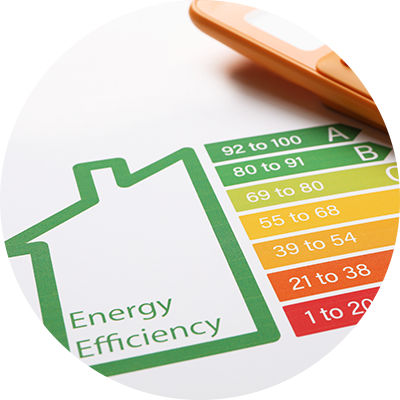EPC Hub for Intermediaries.


What is an EPC?
An EPC (Energy Performance Certificate) illustrates the energy efficiency of a property and provides a rating from A (most efficient) to G (least efficient). It gives a breakdown of the energy performance and the environmental impact of the property, as well as recommendations for efficiency improvements and subsequently, potential cash savings.
As a property owner, your client can use an EPC to their advantage - so it's important that you have a good understanding of the topic. Our EPC Hub for Intermediaries will provide you with all the information you need, including frequently asked questions tailored for you.

The benefits of an EPC
- An EPC provides a rating of a property’s energy usage and its carbon dioxide emissions.
- Your clients can find recommendations on how to improve their EPC rating, saving them money in the long and short term.
- Conscious about the planet? EPCs also offer advice on ways to reduce carbon footprints.
- EPCs are valid for 10 years (but it may be worth re-certificating ahead of the expiry date).
- Looking at an EPC to give your clients an initial snapshot of the cost of the utility bills they can expect from a property.
- Is your client looking to extend their property? An EPC could help point them in the right direction to generate the best value for money.
- Some properties are exempt from requiring a valid EPC, such as listed buildings. View our handy online sources to find out more.

Improveasy
As well as being experts in green home upgrades, they share our passion to make homes warmer, greener, and more cost-effective. Founded in 2011 by CEO Austin Barcley, driven by a vision to create a company that not only made a positive impact on the environment but also to make energy efficiency accessible to everyone, Improveasy has quickly grown into a trusted name in the industry.
EPC Builder, from Improveasy, brings together their in-house services into a web-based online portal, guiding property owners through their retrofit journey in five easy steps.
- Find out the current EPC rating and check if they’re eligible for any grant funding.
- Book an Energy Assessment.
- Receive a detailed Improvement Plan and Thermal Imaging Report.
- Install the chosen green home improvements.
- Enjoy the positive impacts on their property and bills.
EPC Builder
Subject to regional availability. Improveasy predominantly cover the North West, Together's traditional heartland.
Energy Performance Certificate FAQs for Intermediaries
What is an Energy Performance Certificate (EPC)?
An EPC is designed to rate how energy efficient a building is, ranging from A (very efficient) to G (inefficient). Your EPC will tell you how expensive it might be to power, and what its carbon dioxide (CO2) emissions are. If there are improvements to be made, an EPC will also tell you how you could improve your score. For everything you need to know about EPC ratings, read our blog.
What does an EPC check involve and how are they calculated?
An energy assessor needs to visit your property to complete an EPC check, and they’ll look at windows, lighting, heating and insulation to calculate your score. They’ll also look at the age of the property, how it was built, how it’s heated and if hot water tanks are properly insulated. The assessment and report will cost around £60 to £120, and will take around half an hour to complete. You’ll usually have your results back within 72 hours.
Does my client need an EPC on a Commercial property?
Yes, if you’re selling, leasing or building commercial property, you need an EPC and they must have a minimum rating of E. If a building is split into parts, the parts might each need their own EPC. However, the new regulation due to come into force in 2025 does not apply to commercial properties.
Commercial properties don’t need an EPC if they are listed or protected and making improvements would unacceptably alter the building; if it’s a temporary building used for two years or less; if it’s used as a place of worship; if it’s an industrial site, workshop or agricultural building that doesn’t use much energy; if it’s detached with a floor space of less than 50m2, or is due to be demolished by the seller or landlord and they have all the relevant planning and conservation consents.
How can my clients get an EPC assessment?
You need to have a valid EPC to sell or let out a property, so vendors and landlords need to ensure they have the right paperwork in place. The buyer doesn’t need to do anything.
Both vendors and landlords can be fined for not having a valid EPC, so it’s important to make sure they’ve found their EPC online or had an up-to-date assessment.
What are the current minimum energy performance standards for landlords?
Currently, rental properties have to be rated at least an E for landlords to be able to let them out. The Government had proposed that this will change to a C for new tenancies in 2025, then all rental properties in 2028 – however, it has been recently confirmed these timelines will not stand.
How long is an EPC valid for?
An EPC rating is valid for 10 years.
Does my client need an EPC if they’re buying, selling or renting out a property?
Your client needs to have a valid EPC to sell or let out a property, so vendors and landlords need to ensure they have the right paperwork in place. The buyer doesn’t need to do anything.
Both vendors and landlords can be fined for not having a valid EPC, so it’s important to make sure they’ve found their EPC online or had an up-to-date assessment.




